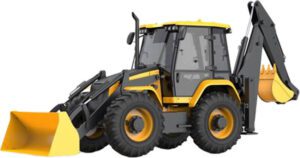
Backhoes for Sale from CanLift
CanLift offers a selection of Backhoes for sale. Call us today at 1-877-338-5438 or contact us using the form – operators are standing by and we ship worldwide!
QUICK QUOTE
Your privacy is very important to us. We do not sell, share, or
distribute any of your personal information with any third parties.
Please read our privacy policy for more information
Backhoes for Sale from CanLift
Find a reliable backhoe for sale in Canada from CanLift. We understand that you have many options for your backhoes and back loaders, and the right equipment will save you time and money. Our goal at CanLift is to make it easy for you to find the right backhoe machines for your needs. We have expert technicians and a friendly customer service team that will help you narrow down the choices of backhoes based on what matters most to you – such as price, features or availability. The best place to start is by contacting us and getting a free quote on a backhoe.
If you are new to the excavation game and considering purchasing a backhoe we have for sale, then there are few things to know about backhoes – a helpful piece of machinery for moving earth in quantities. Sometime referred to as ‘tractor loader backhoes’, or simply ‘back loaders’, these machines are an excellent general-purpose tool, and have been a common mainstay on construction sites for many years.
Free Quotes on Backhoes for Sale in Canada
If you don’t see a backhoe loader for sale in our online inventory, send us a message or request a free quote. Our inventory of backhoes is routinely changing, and we can confirm if we have what you need in stock. You can expect CanLift to provide convenient backhoe machine rentals and sales with prompt and efficient service. Get a free quote today to purchase or lease backhoes in Canada.
Tractor Loader Backhoes
Due to the capability of having working implements on the back as well as the front of tractor loader backhoes, they are famous as great work-horses as productivity improves when a machine can perform double-duty. Whether working in landscaping by paving roads, moving snow or breaking asphalt, or performing small demolition tasks and transporting debris or material from a construction site, a back loader may be the piece of equipment you need to get the job done.
Your Source for Backhoe Machines
CanLift is the trusted source for backhoes and other earthmoving equipment in Canada. Not only do we have an expansive inventory of equipment, but our customer service team is dedicated to the success of each of our clients. We have backhoes for sale or lease at competitive rates, and our flexible financing options help companies of all sizes get the equipment they need. CanLift’s professional technicians ensure our fleet of back loaders and used equipment is ready for their next job, and we can help you troubleshoot any issues that may arise with your construction equipment and backhoe machines.

Satisfaction is guaranteed.
Contact our sales and rental team today
for a free, no-obligation quote.
Frequently Asked Questions about Backhoes
What are backhoes good for?
Backhoes are versatile machines used for various tasks in construction and excavation. They consist of a tractor-like unit with a digging bucket on the back and a loader bucket on the front. One of the primary tasks backhoes are good for is digging. Backhoes can excavate and remove dirt, gravel, or other materials from the ground, making them essential for creating foundations, trenches, or holes for construction projects. Backhoes are also good for loading and lifting. The front loader bucket can lift heavy materials, such as soil or debris, and transport them to another location on the construction site. This capability streamlines the process of moving materials around, enhancing efficiency. Additionally, backhoes are valuable for landscaping tasks. They can shape terrain, level surfaces, or dig trenches for utilities like water pipes or cables. The compact size of backhoes allows them to navigate confined spaces on construction sites or in urban areas. Backhoes are good for digging, lifting, loading, and performing various tasks in construction, excavation, and landscaping, contributing to the efficiency and versatility of construction projects.
What's the max bucket capacity of backhoes?
The maximum bucket capacity of backhoes varies depending on the size and model. Smaller backhoes may have bucket capacities of around 0.2 to 0.5 cubic yards, while larger ones can handle buckets with capacities exceeding 2 cubic yards. The bucket capacity is the amount of material, like dirt or gravel, that the backhoe's bucket can hold at once. It's an important factor because it determines how much material the backhoe can move in a single scoop, impacting efficiency on construction or excavation projects. Choosing the right bucket capacity depends on the specific tasks. Smaller buckets are suitable for precision work and navigating tight spaces, while larger buckets are more efficient for moving substantial amounts of material in open areas. It's crucial to match the backhoe's bucket capacity with the demands of the job to optimize productivity and meet project requirements. Operators need to consider factors such as the size of the excavation or loading tasks and the type of material being moved when selecting the appropriate bucket capacity for a backhoe.
Is training required to operate a backhoe?
Yes, training is required to operate a backhoe. Operating a backhoe involves specific skills and knowledge to ensure safety on the construction site. Proper training is essential to understand the controls, safety procedures, and the correct use of the backhoe's digging and loading functions. Training programs cover important aspects such as machine operation, maintenance, and safety protocols. They teach operators how to maneuver the backhoe efficiently, control the digging depth and reach, and safely load and unload materials. Understanding the weight limits and stability of the backhoe is crucial to prevent accidents. By receiving proper training, operators learn to identify possible hazards, follow safety guidelines, and contribute to a secure working environment. It is not only a legal requirement but also a practical necessity to ensure that backhoes are operated safely and effectively on construction sites. Untrained operators pose a risk to themselves, their coworkers, and the success of the project. Individuals operating backhoes should undergo comprehensive training to acquire the necessary skills and knowledge for safe and efficient operation.
What are the different types of backhoes?
Backhoes come in various types, each designed for specific tasks in construction, excavation, and landscaping. The standard backhoe typically features a digging bucket on the back and a loader bucket on the front, making it versatile for both digging and loading materials. This type of backhoe is commonly used for general construction projects, as it combines the capabilities of a digging machine and a loader. Extendable-arm backhoes, also known as extendahoes, have a longer reach due to their extendable arms. This feature allows them to dig deeper and reach over obstacles, making them suitable for tasks where extended reach is essential, such as digging foundations or reaching challenging excavation areas. Mini or compact backhoes are smaller in size, making them ideal for jobs in confined spaces or urban environments where maneuverability is crucial. Despite their compact design, they retain the digging and loading functionalities of larger backhoes, making them versatile for various tasks. Backhoes with a front-mounted broom attachment are specifically equipped for sweeping and cleaning tasks. The broom attachment on the front allows operators to efficiently sweep and clear debris from surfaces, making these backhoes useful for landscaping, road maintenance, and cleanup operations. Backhoes are also classified based on their power source. While traditional backhoes are powered by diesel engines, there are electric or hybrid versions that are more environmentally friendly and suitable for work in enclosed or sensitive areas. Backhoes come in different types to cater to specific needs. Standard backhoes offer versatility for general construction, extendable-arm backhoes provide extended reach, compact backhoes excel in confined spaces, backhoes with broom attachments are designed for cleaning tasks, and there are environmentally friendly options with electric or hybrid power sources. Each type serves a unique purpose, contributing to the efficiency and adaptability of backhoes in various work environments.
Are mini excavators stronger than backhoes?
Mini excavators and backhoes serve different purposes and as they are used for different reasons, they have distinct strengths. Mini excavators are usually more focused on precision digging and excavation work. Despite their smaller size, they often have powerful digging capabilities, making them great for tasks like digging trenches or excavating in tight spaces. On the other hand, backhoes are versatile machines that combine a digging bucket on the back with a loader bucket on the front. While mini excavators may excel in precision digging, backhoes are generally considered more powerful when it comes to tasks like lifting and loading materials due to their design and larger size. It's not accurate to say that mini excavators are always stronger than backhoes; instead, their strength lies in different areas of construction and excavation work. The choice between a mini excavator and a backhoe depends on the specific job requirements and the tasks at hand.
Are there electric backhoes?
Yes, there are electric backhoes. Electric backhoes are designed to run on electric power instead of traditional diesel engines. This shift to electric power makes them more environmentally friendly, producing fewer emissions and reducing the overall carbon footprint. Electric backhoes typically use rechargeable batteries for their operation. The transition to electric power is part of a broader trend in the construction industry to adopt more sustainable and energy-efficient practices. Electric backhoes offer benefits such as quieter operation, lower maintenance costs, and the ability to work in indoor or enclosed spaces without emissions. The rechargeable batteries can be charged during downtime, ensuring that the backhoe is ready for use when needed. While electric backhoes may have some differences in terms of power and operation compared to traditional diesel-powered ones, they provide a greener and cleaner alternative for various construction and excavation tasks. As technology advances and the demand for eco-friendly equipment grows, electric backhoes are likely to play a bigger part in construction projects.


